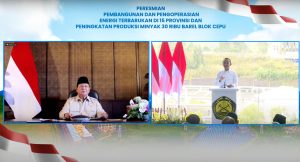Jakarta – Deputy Minister of Environment and Forestry, Alue Dohong, stated that climate change has become a serious threat that has a double impact on Indonesia. According to him, not only does it threaten biodiversity, climate change also worsens economic conditions.
At the International Tourism Investment Forum (ITIF) 2024, he said that the climate crisis requires attention from all parties, not just the government.
“The climate crisis affects all aspects of life, from floods, droughts, extreme heat, to the availability of water and food, as well as the emergence of various diseases,” Dohong said in the forum broadcast via YouTube Kemenparekraf, Friday, June 7.
He emphasised that pollution has become a serious threat, as it affected water, soil, and air mediums, and contaminating synthetic chemicals and plastics that enter the food chain.
“Pollution impacts ecosystems, ocean acidification, ozone depletion, and biodiversity issues. At least 9 million premature deaths occur due to pollution-related diseases, with 80 percent of the urban population exposed to polluted air,” said Dohong.
In his presentation, he underlined the importance of biodiversity for Indonesia’s economy. Indonesia, which has the second largest biodiversity in the world after Brazil, is at risk of losing its rich flora and fauna and forest potential due to poor environmental management, pollution and climate change.
Dohong added that the crisis facing biodiversity will have a huge impact on humanity. “Deaths from extreme weather have fivefold in the last 50 years, and every year 21.5 million people are displaced by disasters,” he said.
A report from a global insurer in 2021 estimated that climate change could cut the world economy by about US$23 trillion by 2050. Developed countries such as the United States, Canada and France are expected to lose 6-10 percent of their economic output, while developing countries such as Malaysia and Thailand could see their economies decline by up to 20 percent compared to 2050 targets.
To address this crisis, Indonesia has increased its climate mitigation commitment to 31.89 percent, equivalent to a reduction of 915 million tons of CO2 by 2030 through its own efforts. “Indonesia also has a long-term strategy using an optimistic low carbon scenario, with a target of achieving net zero emissions by 2060,” Dohong said. (Hartatik)














